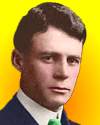
On 9 Feb 1871, Howard Ricketts was born. He lived but 39 years, dying of typhus, the disease he was investigating at the time. But in a career so tragically cut short, he had already made valuable contributions to medical science, and his earlier work on the mode of transmission of another disease (you'll name it in a question below) remains a significant reason to know his name. If you don't, or to know more, read a summary of his life in this Memorial Address. Or, read one of his articles on Rocky Mountain spotted fever.

On 9 Feb of a certain year (see quiz below) the U.S. Weather Bureau (later named the Weather Service) was authorized by Congress. Today's book pick is: Storm Watchers: The Turbulent History of Weather Prediction from Franklin's Kite to El Nino, by John D. Cox. One of the chapters describes the contributions of Cleveland Abbe, who was America's first official meteorologist at the newly created U.S. Weather Bureau. But the author also also introduces the pioneering scientists from the age when meteorology was considered one step removed from sorcery to the modern-day wizardry of supercomputers, as he takes the reader on a fascinating journey through time to show the evolution of weather forecasting.
It is available from Amazon, typically about New from $17.27. Used from $1.98. (As of earlier time of writing - subject to change.)
 | Chance alone is at the source of every innovaton, of all creation in the biosphere. Pure chance, only chance, absolute but blind liberty is at the root of the prodigious edifice that is evolution... It today is the sole conceivable hypothesis, the only one that squares with observed and tested fact. Stating life began by the chance collision of particles of nucleic acid in the “prebiotic soup.” |
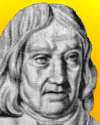 | For God’s sake, please give it up. Fear it no less than the sensual passion, because it, too, may take up all your time and deprive you of your health, peace of mind and happiness in life. Having himself spent a lifetime unsuccessfully trying to prove Euclid's postulate that parallel lines do not meet, Farkas discouraged his son János from any further attempt. |
 | What information consumes is rather obvious: it consumes the attention of its recipients. Hence a wealth of information creates a poverty of attention, and a need to allocate that attention efficiently among the overabundance of information sources that might consume it. |
| Before you look at today's web page, see if you can answer some of these questions about the events that happened on this day. Some of the names are very familiar. Others will likely stump you. Tickle your curiosity with these questions, then check your answers on today's web page. | |
| Births | |
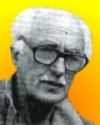 | Alec Zino, born on 9 Feb 1916, was a Portuguese ornithologist and conservationist who gave his name to Europe's rarest breeding bird, which he studied and protected on his native island of Madeira, south-west of Portugal, where this small black and white seabird breeds. What breed of bird is known by Zeno's name? |
 | Howard T. Ricketts, born 9 Feb 1871, was the American pathologist who discovered that a certain disease is spread by cattle ticks and caused by a blood-borne “bipolar bacillus.” What is the name of this disease that Ricketts studied? |
| Deaths | |
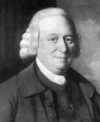 | Nevil Maskelyne (1732-1811) was a British astronomer who made accurate measurements of the transit of Venus on the island of St Helena in 1761. In 1764 he went on a voyage to Barbados for a different purpose. In 1774, he used a plumb line beside a Scottish mountain to determine the Earth's density. What was the purpose on his voyage to Barbados? |
| Events | |
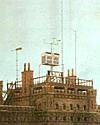 | On 9 Feb of a certain year, the U.S. Weather Bureau (later named the Weather Service) was authorized by Congress, and placed under the direction of the Signal Service. Cleveland Abbe, who had inaugurated a private weather reporting and warning service at Cincinnati (issuing weather reports or bulletins since the previous year) subsequently took a major role in the operation of the U.S. Weather Bureau, and was the first U.S. meterologist. In which decade was the Weather Bureau authorized? |
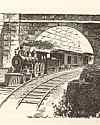 | On 9 Feb 1875, the first train passed through the nearly 5-mile Hoosac Tunnel on the railroad line between Boston and Albany through the Berkshires. It had taken several failed attempts, 200 lives and 20 years to complete the tunnel. Blasting began in 1851, using gunpowder. By 1866, two new tunnelling tools - the compressed air drill and a different explosive - were used in the Hoosac for the first time. What was the explosive first used in the Hoosac Tunnel in 1866? |
Fast answers for the previous newsletter for February 8: Xerox • lightweight, one-cylinder steam engine • holography • neutrons • Isaac Newton • Gregor Mendel.
 If you enjoy this newsletter, the website, or wish to offer encouragement or ideas, please send feedback by using your mail reader Reply button.
If you enjoy this newsletter, the website, or wish to offer encouragement or ideas, please send feedback by using your mail reader Reply button. Your click on a Facebook, StumbleUpon, or other social button on the site webpages is also a welcome sign of appreciation. Thank you for using them.
© This newsletter is copyright 2020 by todayinsci.com. Please respect the Webmaster's wishes and do not put copies online of the Newsletter — or any Today in Science History webpage. (If you already have done so, please remove them. Thank you.) Offline use in education is encouraged such as a printout on a bulletin board, or projected for classroom viewing. Online, descriptive links to our pages are welcomed, as these will provide a reader with the most recent revisions, additions and/or corrections of a webpage. For any other copyright questions, please contact the Webmaster by using your mail reader Reply button.
--
If you do not want to receive any more newsletters, Unsubscribe
To update your preferences and to unsubscribe visit this link
Executive Real Estate Business Class
-
"It was like a man with wings. It wasn't like anything you'd see on TV or in a monster movie." ...
About the publisher
Search This Blog
Blog Archive
-
▼
2021
(585)
-
▼
February
(72)
- Mary Seacole | The Spitfire | George Washington
- On This Day for February 28 - Olof Palme assassina...
- On This Day for February 27 - Chile struck by eart...
- On This Day for February 26 - Napoleon's escape fr...
- On This Day for February 25 - Ousting of Marcos in...
- Demystified: How Do Penguins Tell Each Other Apart?
- On This Day for February 24 - U.S. President Andre...
- On This Day for February 23 - Alamo besieged by Sa...
- On This Day for February 22 - Cloning of Dolly, Ge...
- Your essential guide to the Tudors | LGBT+ history...
- On This Day for February 21 - Malcolm X assassinat...
- On This Day in History by OnThisDay.com: You are n...
- February 21: The 1st Romanov Tsar, the 1st Locomot...
- On This Day for February 20 - John Glenn's orbit o...
- On This Day for February 19 - Iwo Jima invaded by ...
- 🎉 Ready for 30% Off Kids' Memberships?
- On This Day for February 18 - Pluto discovered by ...
- Newsletter for Thursday 18 February.
- Demystified: Why Does Salt Melt Ice?
- On This Day for February 17 - Vietnam invaded by C...
- Newsletter for Wednesday 17 February.
- On This Day for February 16 - Power in Cuba seized...
- Newsletter for Tuesday 16 February.
- On This Day for February 15 - USS Maine destroyed,...
- Newsletter for Monday 15 February.
- February 15: The King of Persia, the Human Genome ...
- Who was Saint Valentine?
- On This Day for February 14 - Fatwa issued against...
- Newsletter for Sunday 14 February.
- February 14: Battle of Cape St Vincent, the Teleph...
- On This Day for February 13 - William and Mary cro...
- Newsletter for Saturday 13 February.
- February 13: Baghdad falls to the Mongols, the Bil...
- On This Day for February 12 - Chile's independence...
- Newsletter for Friday 12 February.
- February 12: The Qing Dynasty Ends, The Senate Acq...
- Demystified: Why Do We Say “A Pair of Pants”?
- On This Day for February 11 - St. Bernadette's fir...
- Newsletter for Thursday 11 February.
- February 11: Margaret Thatcher's Rise to Power, Ne...
- Watch ‘Tuskegee Airmen: Legacy of Courage’
- 🇺🇸💰Your Presidents' Day Exclusive Bonus!
- On This Day for February 10 - Kasparov-versus-comp...
- Newsletter for Wednesday 10 February.
- February 10: End of the French-Indian War, HMS Dre...
- All-New Tonight: 'The Food That Built America' Sne...
- On This Day for February 9 - Calcutta restored to ...
- Newsletter for Tuesday 9 February.
- February 9: Massachusetts Rebels, the Battle of Gu...
- On This Day for February 8 - Mary, Queen of Scots,...
- Newsletter for Monday 8 February.
- February 8: Mary Stuart is Decapitated, Napoleon L...
- What did Mary Tudor think of Anne Boleyn and her o...
- On This Day for February 7 - British Invasion laun...
- Newsletter for Sunday 7 February.
- February 7: The 1st English Prince of Wales, the M...
- Newsletter for Saturday 6 February.
- On This Day for February 6 - Accession of Elizabet...
- February 6: Maximilian I and Elizabeth II Ascend t...
- Black History Month: The Tuskegee Airmen Documenta...
- On This Day for February 5 - Punic Wars ended, Han...
- February 5: Congo Taken as a Personal Possession a...
- On This Day for February 4 - Yalta Conference open...
- February 4: The Chinese Song Dynasty, World's Olde...
- Serving Up an All-New Season
- On This Day for February 3 - Fifteenth Amendment t...
- February 3: The Naval Battle of Diu, Universal Suf...
- On This Day for February 2 - Ban on African Nation...
- February 2: New Amsterdam Grows Up, the US Pays Me...
- On This Day for February 1 - Space shuttle Columbi...
- Newsletter for Monday 1 February.
- February 1: Black History Month Starts and a Day o...
-
▼
February
(72)
-
Blogroll
-
About
HistoryFact










0 comments:
Post a Comment